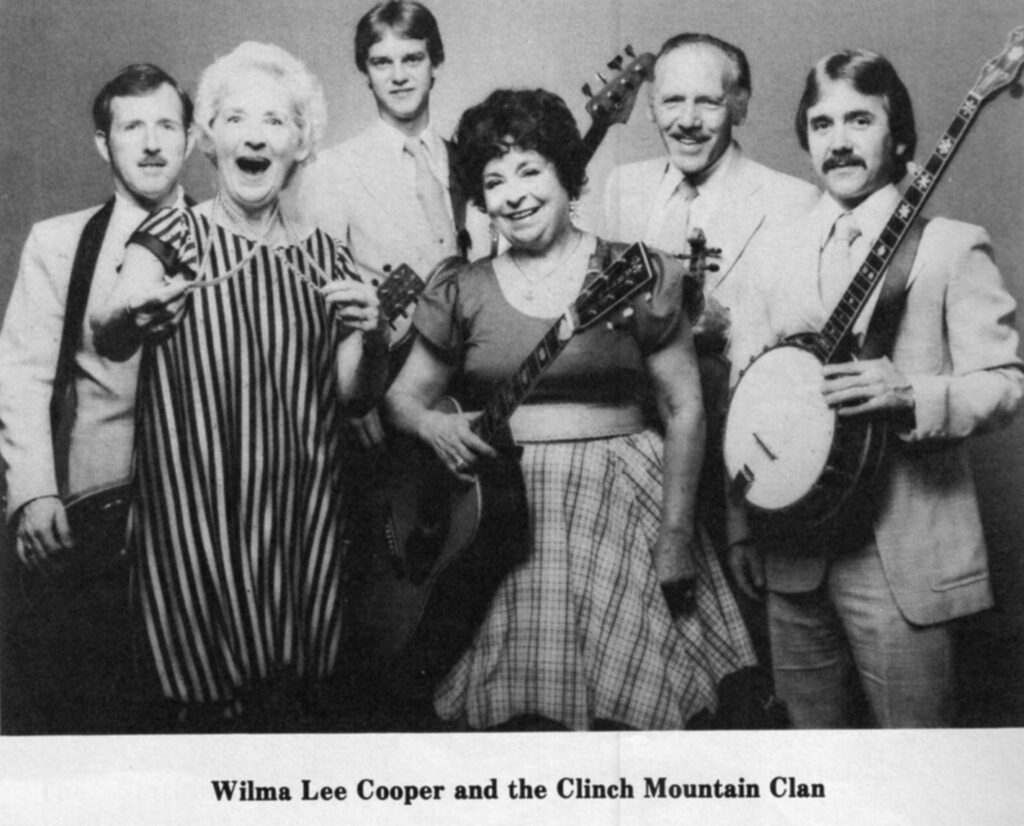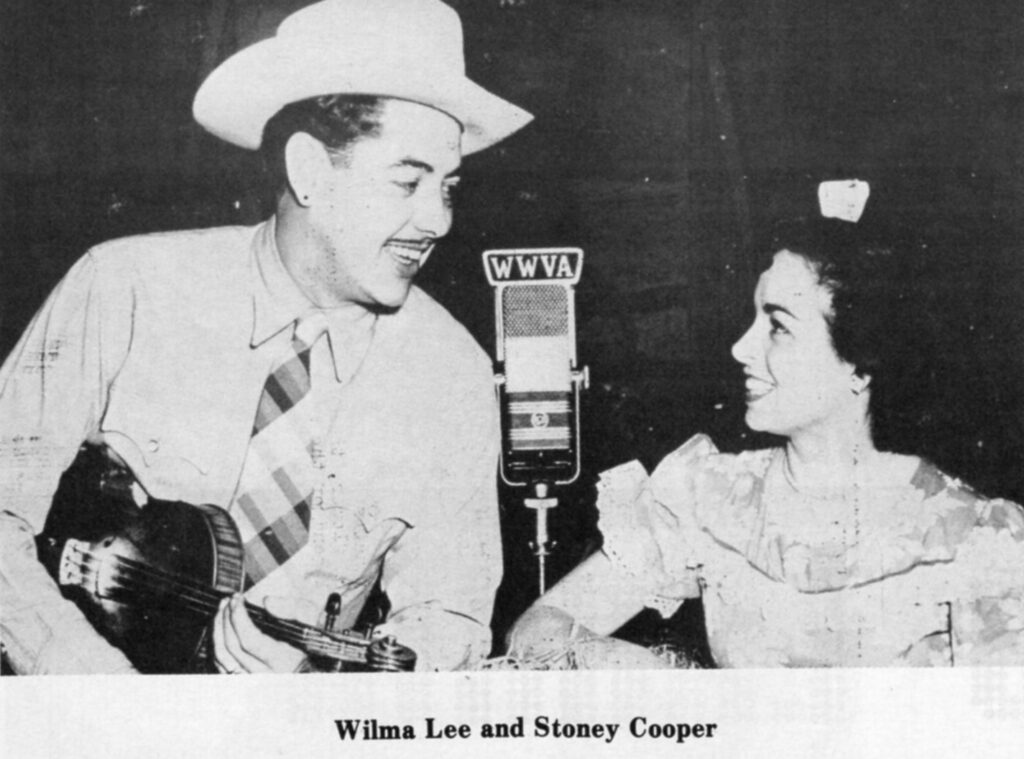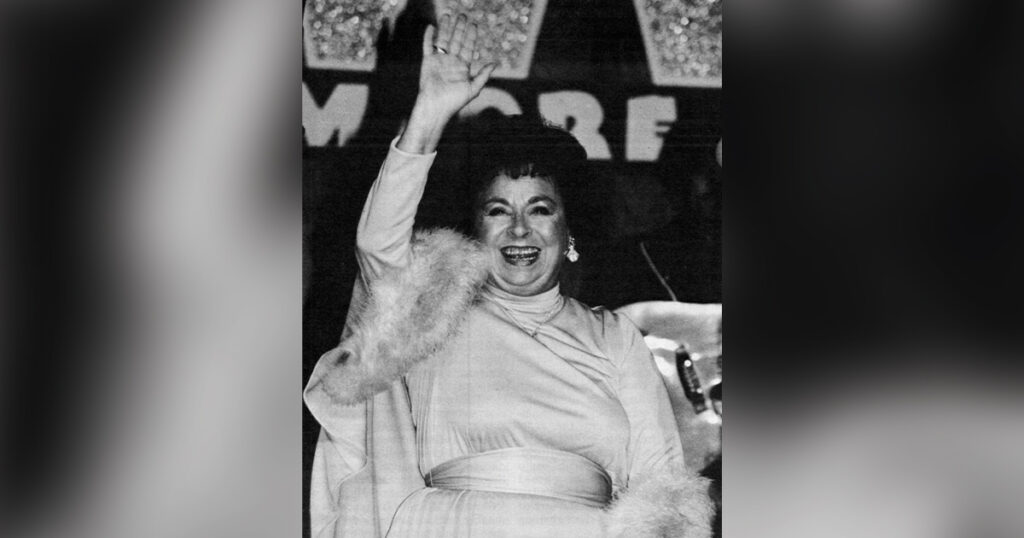Home > Articles > The Archives > Wilma Lee Cooper
Wilma Lee Cooper
Reprinted from Bluegrass Unlimited Magazine
November 1988, Volume 23, Number 5
This article was obtained in a rather unusual setting. Wilma Lee Cooper was playing a festival with Bill Monroe which was held at a county fairground. As this lovely and talented lady came off stage she came to me and said, “Just as soon as I can get away from my record table I’ll send someone in the audience for you and we’ll tape an interview.’’ In a short time the granddaughter of three Grand Ole Opry stars, Wilma Lee and Stoney Cooper and Hank Snow, made her way through the crowd to where I was sitting in a lawn chair listening to Carl Story. “Grandmama’s ready,” she said.
There wasn’t a fair going on; only the festival. As we walked along trying to get away from the crowd we finally found an isolated spot where we could concentrate. The spot turned out to be a livestock stable.
Music has always been a way of life for Wilma Lee Cooper. She was the oldest daughter of the Leary Family Gospel Singers, and began her long career in radio when only a child. “Mom and Dad sang the gospel songs and I, along with my sisters Peggy and Gerry did the ballads,” says Wilma Lee. During this time the family had a heavy schedule of show dates due to the popularity of their radio program and would often have to play two shows to accommodate the crowds.
The Leary Family were featured artists over WSVA radio in Harrisonburg, Virginia, from 1938 until 1940. It was during this time they hired a young fiddle player named Dale T. Cooper better known as Stoney. Wilma Lee and Stoney were married in 1939 and continued working with the Leary Family. Anytime a Grand Ole Opry star would be working near Harrisonburg they would do a guest spot on the Leary’s mid-day program. Uncle Dave Macon, Roy Acuff and many other Opry stars of that era were frequent visitors.
“One day Roy Acuff was our guest and I sang “The Hills Of Roane County” he wanted me to teach it to him and I did. When he returned to Nashville the Opry would not allow him to sing the song because it was a true story and contained the actual people’s names. He then had the song rewrote and titled “The Precious Jewel”—one of his best sellers,” Wilma Lee recalls.
It was the latter part of 1940 that the Leary Family moved to WWVA in Wheeling, West Virginia. After a two year tenure, they decided to move on to WIBC in Indianapolis. At this time Wilma Lee and Stoney had a three-month-old daughter, and Stoney felt it best that they remain in Wheeling and get out of the music business all together.
Stoney took a job with the Bond Beverage Company driving a soft drink truck. He would leave at 5 a.m. and return to the warehouse late at night to turn in the day’s collections and load his truck for the next day. “He hardly ever got home before midnight,” Wilma Lee recalls.

After six months as a soft drink salesman Stoney realized he could make more money and most of all spend more time with his family by playing music. So, he took a job on a radio station in Grand Island, Nebraska. They didn’t use a band, just Wilma Lee on guitar and Stoney would switch from fiddle to Dobro. From Grand Island, they moved to WIBC in Indianapolis, then to WJJD in Chicago, where they remained until the station replaced live music with records.
The next move was to Fairmont, West Virginia. While there they formed their first band called the Blues Chasers. They then moved to Blytheville, Arkansas, where the initial group of the Clinch Mountain Clan was formed. Besides Wilma Lee and Stoney the group included Ab Cole on bass and Bill Carver played both Dobro and mandolin. When Wilma Lee and Stoney left Blytheville they carried the Clinch Mountain Clan with them to WWNC in Asheville, North Carolina.
The group remained at WWNC for only three months. It was there in March of 1947, that Wilma Lee and Stoney with the Clinch Mountain Clan made their first recordings. “We cut sixteen sides in one evening session for the Rich-R-Tone label,” recalls Wilma Lee.
In April, 1947, Wilma Lee and Stoney along with their band moved back to WWVA in Wheeling. They left again for a nine months stay at WRVA Richmond, Virginia. Then back to WWVA where they spent a total of over nine years.
WWVA received a percentage from all their star’s show dates. In return, the artists were featured on the Saturday night Jamboree and Lee Moore would play their records and announce the show dates five nights a week. “They posted a bulletin board every week listing in order what artist had made the most money that week. Stoney and I were the number one money makers every week,” Wilma Lee boasts.
In the late 1940s they signed with Columbia Records where they recorded a legacy of material. Columbia released some of these recordings in the mid 1960s on their budget label Harmony. There were two Harmony albums released: “Sacred Songs” HL-7233 and “Sunny Side Of The Mountain” HS-11178. Both albums have long been out of print.
During their stay at WWVA, Harvard University had some personnel spend a month in Wheeling taping interviews with Wilma Lee and Stoney and recording all of their radio programs. Besides the Saturday night jamboree, they had an early morning program for Carter’s Pills that was transcribed and carried over twenty 50,000 watt stations. All the interviews, recordings and radio programs were carried back to the university where American Music is taught. “They called me an authentic mountain singer,” recalls Wilma Lee.
Stoney decided to include a five-string banjo in the group around 1950. Chuck Henderson, a young banjo player from North Carolina, phoned Stoney, who in-turn sent the boy a bus ticket to Wheeling. Henderson arrived on Tuesday and after a short audition was hired.
The following Saturday night on the Jamboree Stoney introduced the newest member of the Clinch Mountain Clan. Between shows Stoney was summoned back stage to the phone. The caller was Earl Scruggs. He said, “Stoney I was planning on splitting with Lester and ask you for that banjo job, when I heard you announce a few minutes ago that you had already hired a banjo player.”
After ten years with the Clinch Mountain Clan, Bill Carver got out of music completely and went to work for a gas company. Ralph Jones then took the job as Dobro player, but stayed only a short time.

The job then was taken by Buck Graves—today better known as Josh. “Buck stayed with us for six years and during that time he came to me for help on a song he was trying to complete. I helped him finish the song “Happiness Hill” and let him receive full credit for the writing,” says Wilma Lee. Today the song is performed often on Wilma Lee’s stage shows.
By the mid 1950s most radio stations were replacing live broadcast programs with records. Wilma Lee and Stoney signed with Hickory Records in 1955 and their records could be heard on every radio station in the United States that programmed country music. Their first hit on Hickory was “Cheated Too.” It reached the number ten spot nation wide. “Every time I would see Marty Robbins back stage at the Opry he would sing me “Cheated Too.” It was one of his favorite songs. Marty always wanted to record the song, but told me he didn’t feel his voice was country enough,” Wilma Lee recalls.
The Grand Ole Opry sponsored a large package show at Richmond, Virginia, in 1956 where Wilma Lee and Stoney were hired to front the matinee and evening event. After their first performance, they were approached by the Grand Ole Opry manager asking them to join the Opry roster.
On January 12, 1957, Wilma Lee and Stoney along with the Clinch Mountain Clan made their Opry debut. Shortly after joining the Opry they recorded four sides on one session, and three out of the four were hits.
Due to a dispute with Wesley Rose, president of Hickory records, Wilma Lee and Stoney accepted a contract with Decca Records. Decca put them under the direction of Harry Silverstein. One Decca album Dl-74784 was released. Silverstein was searching for the right song that could fit in with Wilma Lee’s mountain style singing and yet be accepted by the Nashville sound. “Harry went into the hospital for routine surgery; he died there on the table, and that brought our relationship with Decca to an end,” recalls Wilma Lee.
When Wilma Lee and Stoney joined the Opry, their fifteen-year-old daughter Carol Lee was playing rhythm guitar with the band. Carol Lee grew up in music much like her mother did. “One day I received a call from Conway Twitty asking me to sing background on his next record. The song was “Each Season Changes You” and he was wanting to do it in the same style Stoney and I did on our Decca album. I had laryngitis and recommended Carol for the job,” Wilma Lee says.
That recording launched the career of Carol Lee Cooper. Today she’s married to evangelist Jimmie Rodgers Snow, son of the Singing Ranger, Hank Snow. Carol and her group, the Carol Lee Singers, are always in demand for Nashville recording sessions, along with being official background singers for the Grand Ole Opry.
Stoney passed away in 1977, leaving Wilma Lee to carry on alone. “He was always there and we both leaned on each other. It was very difficult to continue on but I knew Stoney would want me to,” relates Wilma Lee.
Wilma Lee received another strong blow in 1979, when she lost her sister Peggy. Now there were only Wilma Lee and Gerry remaining of the original Leary Family Singers. Today, Gerry travels on the road with Wilma Lee doing vocals and performing her comedy routine.
The Leary Family’s music was recorded for the Library of Congress in 1938. Wilma Lee also had an album chosen by the White House in 1974. The title was “Wilma Lee and Stoney Cooper” (Rounder 0066). “I received a nice letter from the White House saying they had only a limited number of country albums and were pleased to include one of mine,” says Wilma Lee.
1983 was a most significant year in Wilma Lee’s career. She received four distinguished awards that year: Bluegrass Artist Of The Year, Female Traditional Vocalist Of The Year, Traditional Entertainer Of The Year and Honorary First Lady of Country Music. “I was the second female artist to receive the Honorary First Lady Of Country Music award, Kitty Wells received the first honor in 1982.
“I appreciate very much when I receive an award that’s been voted on by the fans and not by record companies. Today, all the Country Music Awards seem to be bought and block-voted. I’m a lifetime member of the Country Music Association, but I’m seriously considering turning in my resignation, because I don’t like to be a part of that kind of thing,” says Wilma Lee.
Wilma Lee’s strong religious convictions are evident to anyone in her presence. She was raised in a Christian home with all the men on her mother’s side being Methodist ministers. “As far back as I can recall I always wanted to be a preacher.”
Recently, she made that lifetime dream come true by receiving a degree in theology. Wilma Lee’s concerned very much about television evangelists. “There’s probably one out of ten who are working for God, and that’s a shame because they make it hard on the ones who are really trying to spread the gospel. As the Bible says you have to separate the wheat from the chaff.”
Along with playing Canada and one end of the United States to the other, Wilma Lee has made six trips abroad entertaining audiences in Italy, Austria, France and Spain.
Today, she continues to captivate audiences with her authentic mountain style of singing. “My health has always been good and as long as it continues I plan to keep playing the Opry, making records and work the road entertaining old fans and making new ones.”

